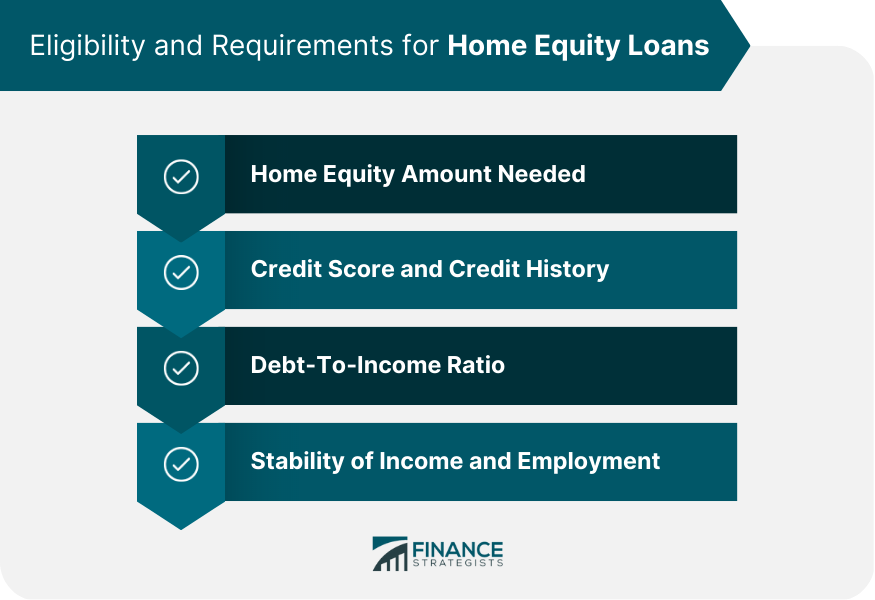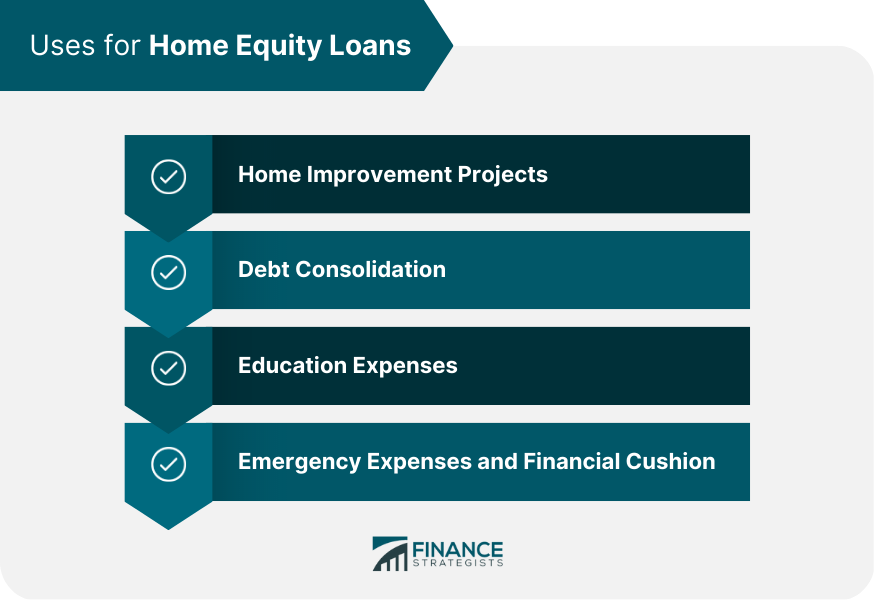A home equity loan is a type of loan that allows homeowners to borrow money using their home's equity as collateral. Home equity is the difference between the current market value of a property and the outstanding mortgage balance on the home. Home equity loans can provide homeowners with access to funds for various purposes, such as home improvements, debt consolidation, or paying for education expenses. These loans typically offer lower interest rates compared to other types of loans, as they are secured by the home's value. A Home Equity Loan (HEL) is a type of loan that provides a lump sum of money to the borrower, which is repaid in fixed monthly payments over a predetermined period. The interest rate for a HEL is usually fixed, meaning it remains constant throughout the life of the loan. A Home Equity Line of Credit (HELOC) is a revolving line of credit that allows borrowers to access funds as needed, up to a specified credit limit. HELOCs typically have variable interest rates, which means the rate can change over time based on market conditions. While both HELs and HELOCs use the home's equity as collateral, they differ in their loan structure and interest rates. HELs offer a fixed amount and interest rate, whereas HELOCs provide more flexibility in borrowing but come with variable interest rates that may change over time. To qualify for a home equity loan, a homeowner must have a sufficient amount of equity built up in their home. Lenders typically require that borrowers have at least 15-20% equity in their property. Lenders will evaluate a borrower's credit score and credit history to determine their creditworthiness. A higher credit score and a strong credit history can lead to better loan terms and lower interest rates. The debt-to-income (DTI) ratio is another factor lenders consider when evaluating a borrower's eligibility for a home equity loan. A lower DTI ratio indicates that the borrower has a better balance between their debt and income, making them a lower risk to the lender. Lenders will also assess the borrower's income and employment stability to ensure they have the financial means to repay the loan. A stable job history and consistent income can increase the likelihood of loan approval. Before applying for a home equity loan, borrowers should gather necessary documents, such as proof of income, tax returns, and a recent home appraisal or valuation. Borrowers should compare different lenders and loan options to find the best fit for their needs and financial situation. Factors to consider include interest rates, loan terms, and fees associated with the loan. The application process for a home equity loan typically involves submitting an application, providing required documentation, and waiting for the lender's approval. The timeline for approval can vary depending on the lender and the borrower's financial situation. Home equity loans may have closing costs and fees, such as origination fees, appraisal fees, and title search fees. Borrowers should be aware of these costs and factor them into their overall loan expenses. Home equity loans offer several benefits, including lower interest rates compared to other types of loans, fixed repayment terms, and the potential for tax-deductible interest payments. Additionally, they provide access to a significant amount of funds, which can be used for various purposes. There are also risks and drawbacks associated with home equity loans, such as the potential for foreclosure if the borrower cannot make the loan payments. Borrowers should also consider the impact of taking on additional debt, as well as the potential for their home's value to decrease over time. One of the most common uses for home equity loans is funding home improvement projects. These projects can improve the property's value and enhance the homeowner's quality of life. Home equity loans can be used to consolidate high-interest debt, such as credit card balances, into a single loan with a lower interest rate. This can help borrowers save money on interest payments and simplify their debt management. Home equity loans can also be used to pay for education expenses, such as college tuition or private school fees. This can be a more cost-effective option compared to other types of education loans. Homeowners may choose to use a home equity loan to cover emergency expenses or create a financial cushion for unforeseen events. This can provide peace of mind and financial security in times of need. Personal loans are unsecured loans that can be used for various purposes, including home improvements or debt consolidation. While personal loans typically have higher interest rates than home equity loans, they do not require the borrower's home as collateral. Cash-out refinancing involves refinancing the existing mortgage for a higher amount and receiving the difference in cash. This option can provide access to funds for various purposes, but it may result in a higher overall mortgage balance and a longer repayment term. Credit cards can be used for short-term financing needs, but they often come with higher interest rates compared to home equity loans. They may be suitable for smaller expenses or when immediate access to funds is necessary. When considering home equity loan alternatives, borrowers should evaluate their individual needs, financial situation, and the associated costs and benefits of each option to determine the best course of action. Borrowers should have a clear understanding of the repayment terms and interest rates associated with their home equity loan. This includes the loan term, monthly payment amount, and whether the interest rate is fixed or variable. Paying off a home equity loan early can save borrowers money on interest payments and reduce their overall debt burden. Strategies for early repayment may include making extra payments, refinancing the loan, or using windfalls, such as a bonus or inheritance, to pay down the balance. In some cases, the interest paid on a home equity loan may be tax-deductible. Borrowers should consult with a tax professional to understand the potential tax implications of their home equity loan and determine their eligibility for deductions. Home equity loans can provide homeowners with access to funds for various purposes, but it is crucial to understand the associated costs, benefits, and risks. A thorough understanding of home equity loans can help borrowers make informed decisions and ensure they select the best financing option for their needs. By considering factors such as eligibility requirements, loan terms, interest rates, and potential alternatives, borrowers can make informed decisions about whether a home equity loan is the right choice for their financial situation. Careful research, comparing options, and understanding the implications of taking on additional debt can help homeowners make the most of their home equity and achieve their financial goals.What Are Home Equity Loans?
Types of Home Equity Loans
Home Equity Loan (HEL)
Home Equity Line of Credit (HELOC)
Comparison of HEL and HELOC Features
Eligibility and Requirements for Home Equity Loans
Home Equity Amount Needed
Credit Score and Credit History
Debt-To-Income Ratio
Stability of Income and Employment

How to Apply for a Home Equity Loan
Preparing Necessary Documents
Comparing Lenders and Loan Options
Application Process and Timeline
Closing Costs and Fees
Pros and Cons of Home Equity Loans
Advantages of Home Equity Loans
Risks and Drawbacks of Home Equity Loans
Uses for Home Equity Loans
Home Improvement Projects
Debt Consolidation
Education Expenses
Emergency Expenses and Financial Cushion

Home Equity Loan Alternatives
Personal Loans
Cash-Out Refinancing
Credit Cards
Comparing Alternatives Based on Individual Needs
Managing and Repaying Home Equity Loans
Understanding Repayment Terms and Interest Rates
Strategies for Paying off the Loan Early
Potential Tax Implications
Conclusion
Importance of Understanding Home Equity Loans
Making Informed Decisions on Home Equity Loans and Alternatives
Home Equity Loans FAQs
A home equity loan is a type of loan that allows homeowners to borrow money by using their home's equity as collateral. The amount of the loan is based on the value of the home and the amount of equity the homeowner has in the property.
With a home equity loan, the homeowner receives a lump sum of money and pays it back over a set period of time, usually with a fixed interest rate. The loan is secured by the home's equity, meaning that if the homeowner fails to make payments, the lender can foreclose on the property.
Home equity loans can be used for a variety of purposes, including home renovations, debt consolidation, and major purchases. However, it is important to note that the loan must be paid back in full, with interest, regardless of how the funds are used.
The interest rate for a home equity loan is typically based on the homeowner's credit score, the amount of equity in the home, and current market conditions. It is important to shop around and compare rates from different lenders before choosing a home equity loan.
One risk of taking out a home equity loan is the possibility of defaulting on the loan and losing the home to foreclosure. Additionally, home equity loans can carry higher interest rates than other types of loans, which can result in higher monthly payments and a longer repayment period. It is important for homeowners to carefully consider their financial situation and ability to repay the loan before taking out a home equity loan.
True Tamplin is a published author, public speaker, CEO of UpDigital, and founder of Finance Strategists.
True is a Certified Educator in Personal Finance (CEPF®), author of The Handy Financial Ratios Guide, a member of the Society for Advancing Business Editing and Writing, contributes to his financial education site, Finance Strategists, and has spoken to various financial communities such as the CFA Institute, as well as university students like his Alma mater, Biola University, where he received a bachelor of science in business and data analytics.
To learn more about True, visit his personal website or view his author profiles on Amazon, Nasdaq and Forbes.











